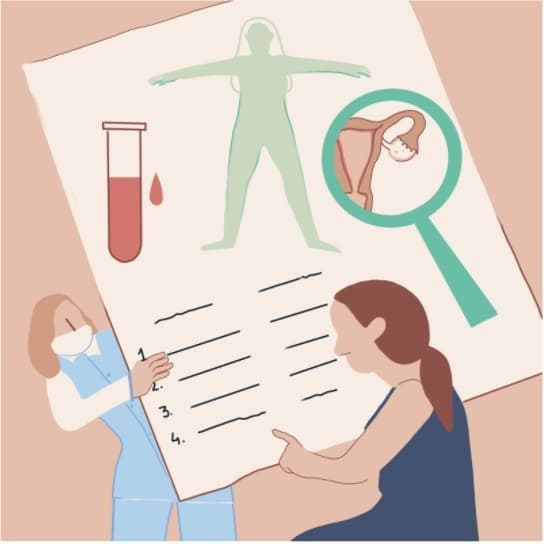It is no secret that prevention is better than cure. A proactive approach to your health today can get you one step closer to avoiding health complications later in life. Health screenings are a great way to ensure this! The screening tests that one needs, depend on age, family history, personal health history, and other risk factors.
Screenings are recommended for the following reasons:
- Identify your current state of health
- Assess your risk for future medical problems
- Encourage a healthy lifestyle
- Update vaccinations
- Help you get to know your medical provider in case of an illness
Yearly well-woman visit
For all those newly independent women, make your annual well woman visit a priority if you aren't already. This is a great time to discuss ALL of your concerns with your healthcare provider. We're talking vaginal discharge, sexual health, birth control options, vitamin deficiencies, the whole lot. If you've been dealing with a long term condition, even more than one visit may be necessary.
Some of the following may be covered in your well woman exam too!
- Breast Examinations
As a woman in your 20’s or 30’s your yearly gynecologist visit may have a clinical breast examination. An absolutely quick and non painless procedure by itself, this examination allows your doctor to examine for any early symptoms of breast cancer. For any proactive persons out there, we also encourage self breast examinations. They involve a woman herself looking at, and feeling each breast for possible lumps, distortions or swelling. It is recommended to be repeated every 2-3 years. In your 40’s mammograms and ultrasound may replace this.
- Cervical Cancer Screening
This also forms an essential component of the yearly exams, which includes either a PAP smear every 3 years for young, sexually active women (20-35 years ) or an HPV test (once every 5 years). It is done to look for the signs of cervical cancer. Cervical cancer shows the best prognosis if detected in early stages.
- Screening for STIs
STI’s if left untreated can be potential causes of pelvic inflammatory disease and infertility. You could also end up passing these on to future partners and potential children. This makes STI testing all the more crucial. The reasons women need to be more mindful are:
- Many STIs like HPV, Chlamydia, and Gonorrhoea are sometimes asymptomatic
- Female genitalia is more convoluted and a painless ulcer hiding in the labia can sometimes go unnoticed for a while.
It is always a great idea to get tested on any of these milestones:
- You have never been checked before
- You are entering a new relationship
- You have indulged in high risk behavior in the past
- You are trying to have a baby
- You are pregnant
- You're sexually active and at risk, you'll need vaginal testing for chlamydia and gonorrhea every year.
Only testing isn’t enough ! Please have conversations around and practice consent and safe sex!
A small prick and a blood test every year can tell you a lot.
Remember, a lot of conditions affect women differently such as diabetes and heart disease. This makes prevention all the more important!
Let’s make this very easy to remember - ABC’s!
- A stands for Anemia:
Do get your haemoglobin levels checked periodically. It provides a peek into your overall health and nutritional status. The same blood sample can also tell you about potential nutrient deficiencies such as Iron and B12 that may be causing your anaemia.
- B stands for Blood Pressure Screenings and Bone Health:
During your yearly check up, a discussion about your blood pressure result with your doctor is significant. Chronic high blood pressure affects the functioning of the heart, kidneys, eyes, and brain - leading to serious complications.
Bone density tests are ideally recommended for all women of age 65 and above to screen out osteoporosis. Menopausal women are at high risk of losing bone calcium due to hormonal imbalances. But as a young woman, get your Vitamin D levels checked once a year at least and make sure you start taking supplements for calcium and Vitamin D in your 30s. It is important to address its deficiency for healthier bones in old age.
- C stands for Cholesterol and Lipid Profile Screenings
This is a simple blood test done in the morning on an empty stomach. Talk to your doctor about good and bad cholesterol. Estrogen has a protective role in keeping your cholesterol levels healthy and this gets lost after menopause. It's best to have this addressed and keep your heart healthy well in time.
- D stands for Diabetes and Dental Examinations
All adults must be screened for diabetes or prediabetes in their 40s, regardless of weight. If you are overweight, you should check your blood sugar, even if you are not showing symptoms of diabetes. PCOS, which is as common as 1 in 5 women in urban populations can also predispose you to diabetes.
Dental screenings will consist of screening for caries, gum inflammation and oral disease. Tobacco product users may also need to take up a yearly screening.
- E stands for Eye Examinations & Exercise
Routine visits for eye check ups like the basic visual acuity screening identifies if and when one will need to start using glasses or if any corrections are required. Eye examinations are even more high value if you have diabetes or high blood pressure.
The 20’s are also a fantastic age for you to start incorporating physical activity as a form of your lifestyle. Whether muscle building or weight loss is the goal, now is the time to get started. Find an activity that works for you and makes you fitter. A minimum of 150 minutes of physical activity is recommended for great heart health.
- F stands for Feeling Good and Freedom from Substance Dependence
If you think you’ve picked up a habit that’s hard to kick, whether it's alcohol or tobacco overuse, seek help from your healthcare providers. If your specialist isn’t a safe non-judgemental space for you, find a mental health provider that suits your needs. Mental Health is as important as your physical health if not more! It has an impact on every aspect on your life right down to your period. So take all the steps you need to, to form a supportive system to address your mental well being.
Recommended screenings (age wise) in a nutshell:

Good health is a woman’s treasure and nothing can redeem your time lost to illness. Being proactive about your health through regular screenings, is a small but imperative step in ensuring a healthy life.
Disclaimer: This information is provided for educational purposes and should not be construed as medical advice. Please consult with your healthcare practitioners before undertaking any changes in your diet or adding supplements.
We at Proactive aim at creating a world-class medical experience for Indian women and adopt gold standards in every healthcare initiative whether it’s a teleconsultation or a webinar. What sets us apart from the rest is our liberal, convenient, and holistic approach to healthcare. Proactive for her is a digital clinic for women, offering accessible, personalized, and confidential health-care solutions. We offer products and services for out-patient health concerns of Indian women, across their lifetime - from puberty to pregnancy to menopause. To know more on the sexual and reproductive health of women, visit https://www.proactiveforher.com/

